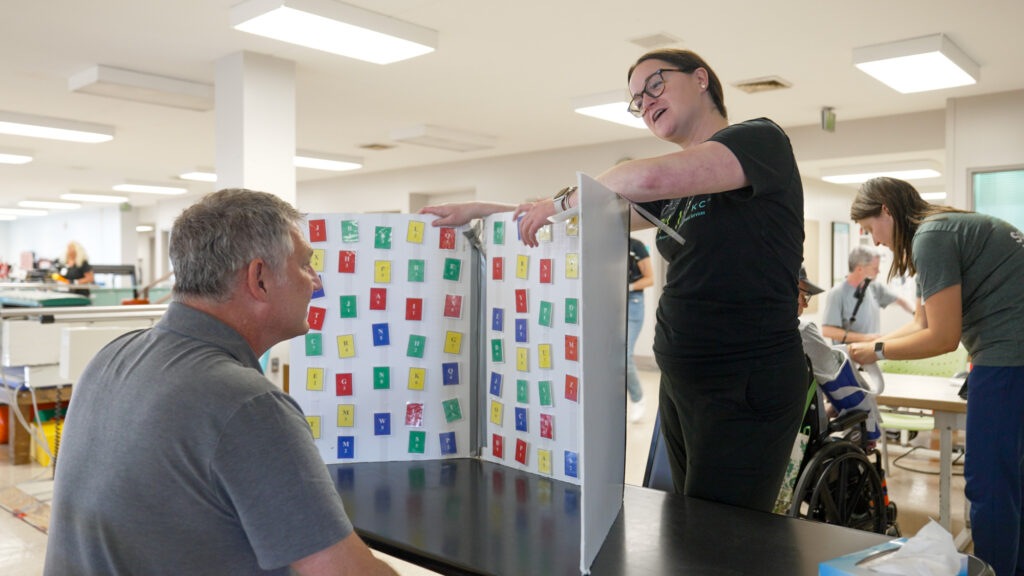
If your loved one — a parent, child, sibling, other family member, or friend — has experienced a traumatic brain injury (TBI), it can be a scary time, filled with questions about what comes next. Your immediate focus will likely be on securing the best medical care, whether at a local hospital or treatment center, and the good news is, there is a great facility in the Kansas City, Missouri, area. But what happens after the initial treatment? Outpatient medical rehabilitation, often called outpatient rehab, is a crucial step in their recovery journey.
Why outpatient medical rehabilitation is important after a TBI
Here’s why outpatient medical rehabilitation is so important for individuals following a TBI:
- Continuing progress by building on strengths — Outpatient rehab is the next crucial step for TBI recovery. Outpatient rehabilitation builds on existing strengths gained during inpatient care. It offers personalized therapy to help continue your loved one’s recovery as they keep working to regain their independence and reintegrate into their communities. Their therapists will work with their existing strengths to help improve:
- Physical abilities — This could involve helping them regain balance, coordination and strength to perform daily tasks, getting dressed or preparing a simple meal.
- Cognitive skills — Memory, focus and problem-solving may be affected. Their therapists can design exercises to strengthen these areas, making daily life easier, like remembering grocery lists or following recipes.
- Communication skills — Speech may be slurred, or finding the right words may be difficult. Outpatient rehabilitation can help your loved one regain confidence and clarity in expressing themselves, whether while ordering food or catching up with friends.
- Relearning daily tasks to help regain independence — A TBI can disrupt even the most basic routines. Outpatient rehabilitation can help your loved one relearn how to do things they used to do automatically, like:
- Managing medication — Remembering to take medication on time is crucial. Their therapists can help them develop strategies to help make this easier, like setting reminders on their phone or using a pill organizer.
- Planning and organizing — Scheduling appointments, managing finances or cooking a meal may require new approaches. Your loved one’s therapists can help them develop these skills, like creating a calendar or using a budgeting app.
- Using transportation — Getting around safely, whether by car, bus, or the KC Streetcar, may need to be relearned. Your loved one’s therapists can help guide them on safe practices, like practicing navigating public transportation, using ride-sharing apps with clear instructions, or undergoing driver evaluations to drive safely.
- Addressing emotional challenges for well-being — A TBI can significantly impact your loved one’s emotional state. They may experience:
- Frustration — Recovering takes time, and setbacks may happen. Their therapists can help them manage frustration and stay motivated.
- Depression — Feeling down or hopeless can be common. Your loved one’s therapists can provide support, teach them coping skills, like mindfulness techniques, and help them get connected with local TBI support groups in Kansas City.
- Anxiety — Returning to daily life can be anxiety provoking. Their therapists can help them learn how to manage their anxiety and feel more confident, perhaps by practicing relaxation techniques in a familiar park.
- Learning how to help by involving the whole family — A TBI affects not only the injured person but also those around them. An accredited, high-quality outpatient rehabilitation facility in Kansas City, like Ability KC, can provide support for the entire family by:
- Educating you — Your loved one’s therapists will explain the recovery process and how you can best support your loved one.
- Teaching coping skills — You’ll learn strategies to manage challenging behaviors or emotional outbursts that may occur, like de-escalation techniques or setting clear communication boundaries.
- Improving communication — Their therapists can help you and your loved one communicate effectively to avoid misunderstandings, perhaps by role-playing conversations or setting aside dedicated talking time each day.
- Maintaining progress and preventing decline — Outpatient rehabilitation can help your loved one maintain the progress made during inpatient care and prevent regression. Their therapists will create a personalized plan for continued improvement so that your loved one doesn’t lose the ground they’ve gained.
Finding the right outpatient rehabilitation facility in Kansas City, MO
With a variety of outpatient rehabilitation facilities available in Kansas City here are some tips to help you choose the right one for your loved one:
- Consider location and accessibility.
- Consider insurance coverage.
- Consider accreditations, specializations and services offered.
Why choose Ability KC for your loved one’s outpatient rehabilitation after a TBI?
Here’s why Ability KC stands out as an exceptional option for your loved one’s recovery journey as the outpatient rehabilitation facility of choice in Kansas City:
- Experienced and compassionate team
- Nationally accredited for stroke, TBI, spinal cord injury and limb loss/amputation
- Comprehensive and personalized programs
- Focus on functional independence
- Integrated approach to care
- Proven track record of improving outcomes for over 75 years
- Focus on the whole family
By choosing Ability KC for your loved one’s outpatient rehabilitation for TBI recovery, you’re giving them the best chance to achieve their full potential. Our team of experienced professionals includes physical, occupational, speech and language therapists as well as nurses, case managers and social workers. This multifaceted team will create a personalized plan, provide compassionate care and help empower your loved one to return to the life they enjoy.
Ability KC is a designated Comprehensive Outpatient Rehabilitation Facility (CORF) with a Commission on Accreditation of Rehabilitation Facilities (CARF) accreditation. Contact our team today for more information or to schedule an initial appointment.